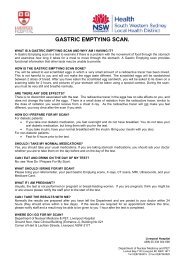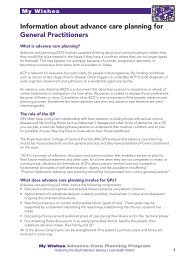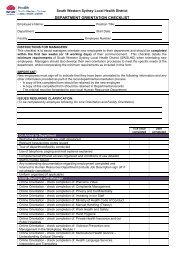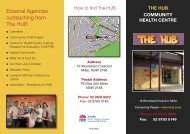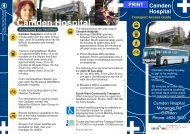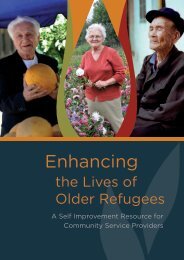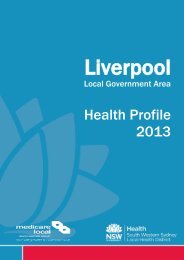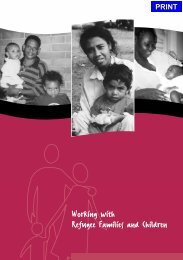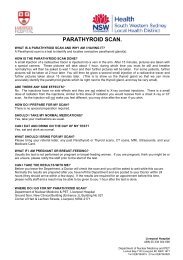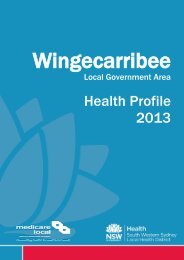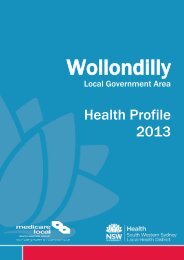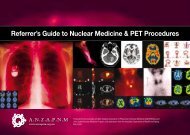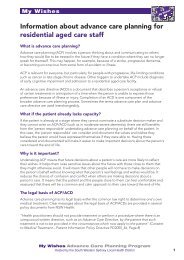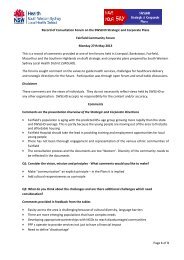Issues Paper - South Western Sydney Local Health District - NSW ...
Issues Paper - South Western Sydney Local Health District - NSW ...
Issues Paper - South Western Sydney Local Health District - NSW ...
You also want an ePaper? Increase the reach of your titles
YUMPU automatically turns print PDFs into web optimized ePapers that Google loves.
A Research Strategy for <strong>South</strong> <strong>Western</strong> <strong>Sydney</strong> <strong>Local</strong> <strong>Health</strong> <strong>District</strong> – <strong>Paper</strong> No.1 <strong>Issues</strong> Final April 2012The importance of feedback to individuals and communities i.e. the outcome, benefit topatients and the broader community.Building on SWSLHD Community/Consumer networks, consumers indicated that there may bebenefits in involving them in research design and explaining research to potentialparticipants.Summary of issuesThere are significant barriers to community participation in research in SWSLHDincluding research literacy, language and culture.4. Ethics and Research GovernanceThe SWSLHD Ethics and Research Governance Office is responsible for administeringsubmissions to the SWSLHD Human Research Ethics Committee and providing advice andinformation about research ethics and human research governance policies.Although research volume (i.e. nationally funded studies and clinical trials) in SWSLHD hassignificantly increased, resourcing of the Office does not reflect demand. Researchersidentified considerable delays in processing and following up applications, placing grants,trials and student research at risk. In addition, the new ethics staff have not yet developedthe relationships and educational programs essential to support researchers.In 2007, <strong>NSW</strong> implemented a system of single ethical & scientific review of multi-centreresearch to ensure that it is only ethically reviewed once. Under this system, Lead <strong>Health</strong>Research Ethics Committees (HREC) are accredited to undertake a single review on behalfof all sites in the public health system. Unfortunately, the SWSLHD HREC is not an accreditedLead HREC because it lacked sufficient staff and may only review research undertakenwithin the <strong>District</strong>. As a result, SWSLHD applications for large multisite research have to be sentto an external accredited Lead HREC for approval. Site Specific Applications (SSA’s) requiredfor all research occurring in SWSLHD are a problem with multiple levels of signoff (by SWSLHDclinical and non-clinical services e.g. medical records) before approval can be given.Differing expectations, variability in procedures and variation in forms increases confusion,duplication and the likelihood of error or omission and makes the ethical approval processarduous. Differing understanding by managers of their delegation can mean that an SSAmay be rejected by a facility on ethical grounds even though approved by a HREC.The Australian Research Ethics Database (AU RED) is used to manage all National EthicsApplication Forms (NEAF) and Site Specific Applications (SSA). Although useful for clinicaltrials, it does not meet the Ethics Office requirements for other work which require Ethicalconsideration e.g. quality assurance. Low risk studies are reviewed under the separate lowrisk framework by subcommittees of the HREC.There was considerable support for increasing resourcing to the Office and in developingeducation and training for researchers and the Ethics Committee.Summary of issuesThe Research and Ethics Office is under resourced to meet the requirements to be alead ethics committeeSSA processes are time-consuming and variable.SWSLHD| 19



